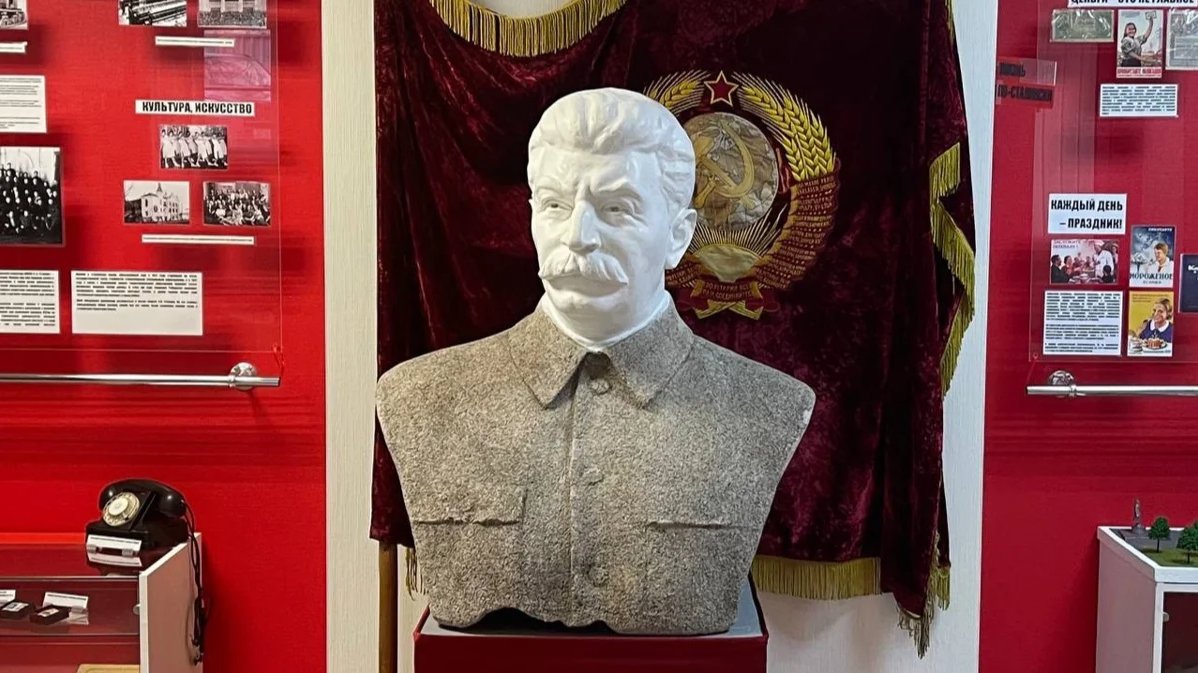As part of the recent Long Night of Museums, the Stalin Centre in the Siberian city of Barnaul held a Mikhail Bulgakov-inspired event originally billed as summoning the spirit of Stalin. What followed involved no contribution from the other side, however, and instead an actor from the local theatre appeared on stage to reveal a “kind-hearted” man who faced every task “with humour and understanding”.
And they weren’t joking, either. The founder and director of the centre, Sergey Matasov, truly believes the purges were justified, the deportations necessary, and the expression “to do things in a Stalinist way”, which he promised to do with foreign agents and Navalny supporters, means “to enrich culturally, morally and historically”.
This article first appeared in Novaya Gazeta Kazakhstan
As part of the recent Long Night of Museums, the Stalin Centre in the Siberian city of Barnaul held a Mikhail Bulgakov-inspired event originally billed as summoning the spirit of Stalin. What followed involved no contribution from the other side, however, and instead an actor from the local theatre appeared on stage to portray a “kind-hearted” man who faced every task “with humour and understanding”.
And they weren’t joking, either. The founder and director of the centre, Sergey Matasov, truly believes the purges were justified, the deportations necessary, and the expression “to do things in a Stalinist way”, which he promised to do with foreign agents and Navalny supporters, means “to enrich culturally, morally and historically”.
‘They’re conning poor old ladies’
It is a May evening in the city of Barnaul, the capital of the Altai region of southern Siberia, and the city is bathed in long-awaited heat. A crowd has gathered outside an office block where the local Stalin Centre is hosting a séance as part of the Long Night of Museums.
Sergey Matasov, the founder and chairman of the board of the Stalin Centre, explains, “We plan to reproduce the Bulgakov séance, in 1930s style, from his famous short story of the same name, to summon the spirit of Stalin to the Stalin Centre.”
Dressed in a dark blue jacket and a T-shirt featuring black-and-white portraits of Marx, Engels, Lenin and Stalin, Matasov is a 34-year-old Communist party deputy in the regional assembly. Affable and welcoming, he tells me straight away that he’s “always glad to meet journalists”, and offers to give me a tour of the premises. As we explore the site, he tells me that he’s been a staunch communist since his youth, but admits to feeling some disillusionment from his many years of association with the Communist party.
“There are many people making political and monetary capital, conning poor old ladies who still believe that their representatives are Bolsheviks and revolutionaries. Stalin had a word for people and parties like that — opportunists. They leech off Soviet slogans, but are in fact living comfortable capitalist lives.”
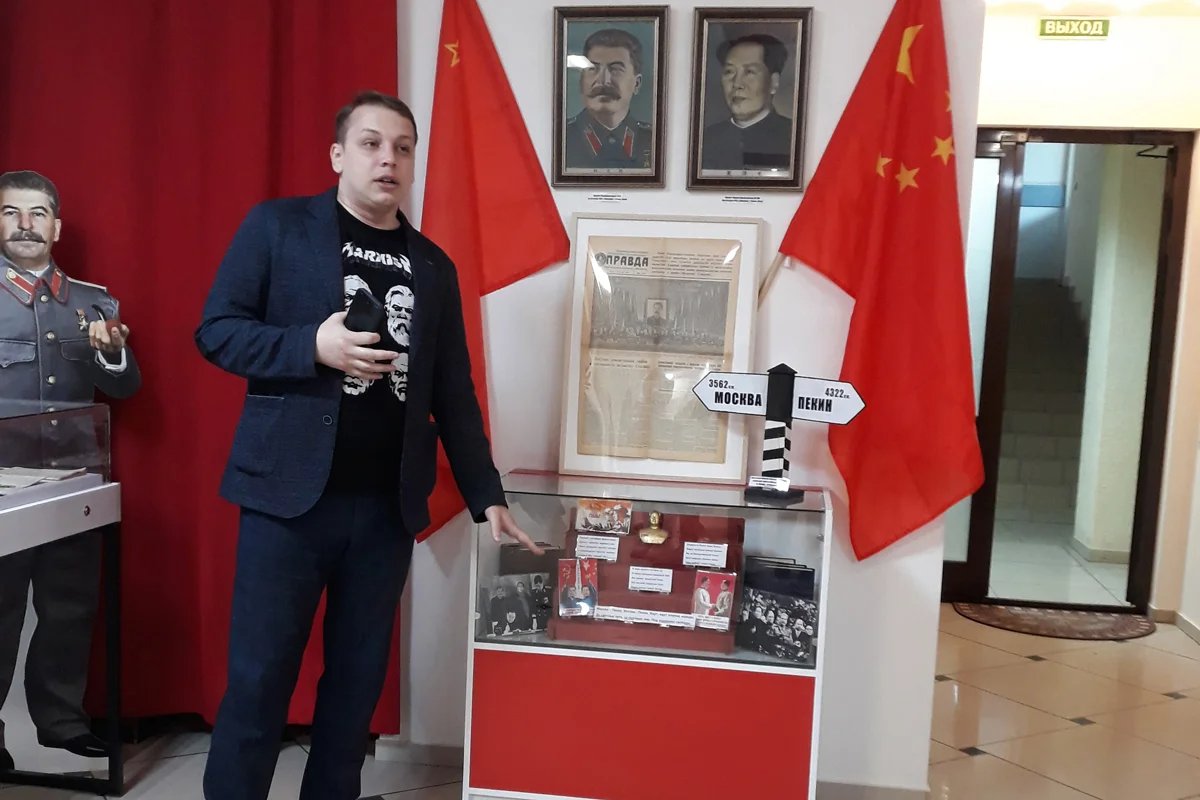
Sergey Matasov at the Stalin Centre Long Night of Museums event. Photo: Irina Shipulina/ VK
The Stalin Centre is one large room that features information boards and artefacts from the Stalin era, and in which Matasov has an office. For the Long Night of Museums, some of the exhibits have been removed to make way for the approximately 250 would-be attendees, only 60 of whom can be admitted.
Some of those who don’t make it in can be heard moaning about the cordoned off media area, where Novaya Gazeta Kazakhstan is joined by colleagues from state-owned news agency TASS, Telegram channel Mash and various local media outlets. “They didn’t tell us there’d be so many journalists,” a voice from the back row complains. “Things would be different if they weren’t here.”
‘A bastion of world Stalinism’
The idea for the Stalin Centre came to Matasov in 2021 when he visited his friend Alexey Zorov, a fellow communist who hoped to build a Stalin Centre in the town of Bor in central Russia’s Nizhny Novgorod region. Zorov had planned to use 20 million rubles (€205,000) of his own money to build the three-storey complex he had in mind, but construction was postponed indefinitely in 2022 due to a sharp rise in the cost of building materials following Russia’s invasion of Ukraine. Zorov was forced to content himself with a statue of the generalissimo instead.
Matasov loved Zorov’s idea, though, and found that creating a Stalin Centre in Barnaul was a far easier process. Matasov found local sponsors among his colleagues in the regional assembly. Many are board members and pay monthly membership fees. He pays part of his salary for upkeep and bills. The Communist Party doesn’t support the centre and it is listed as a non-profit.
The audience is greeted by a table with a Ouija board and a ball-shaped plasma lamp. The performance should have started 15 minutes ago. As compère, Matasov praises the centre as “a bastion of world Stalinism” and “a place for creativity”. The state media journalists giggle.
The show begins. An entertainer in a tailcoat appears and the Stalin Centre activists begin their presentation of Bulgakov’s Séance.
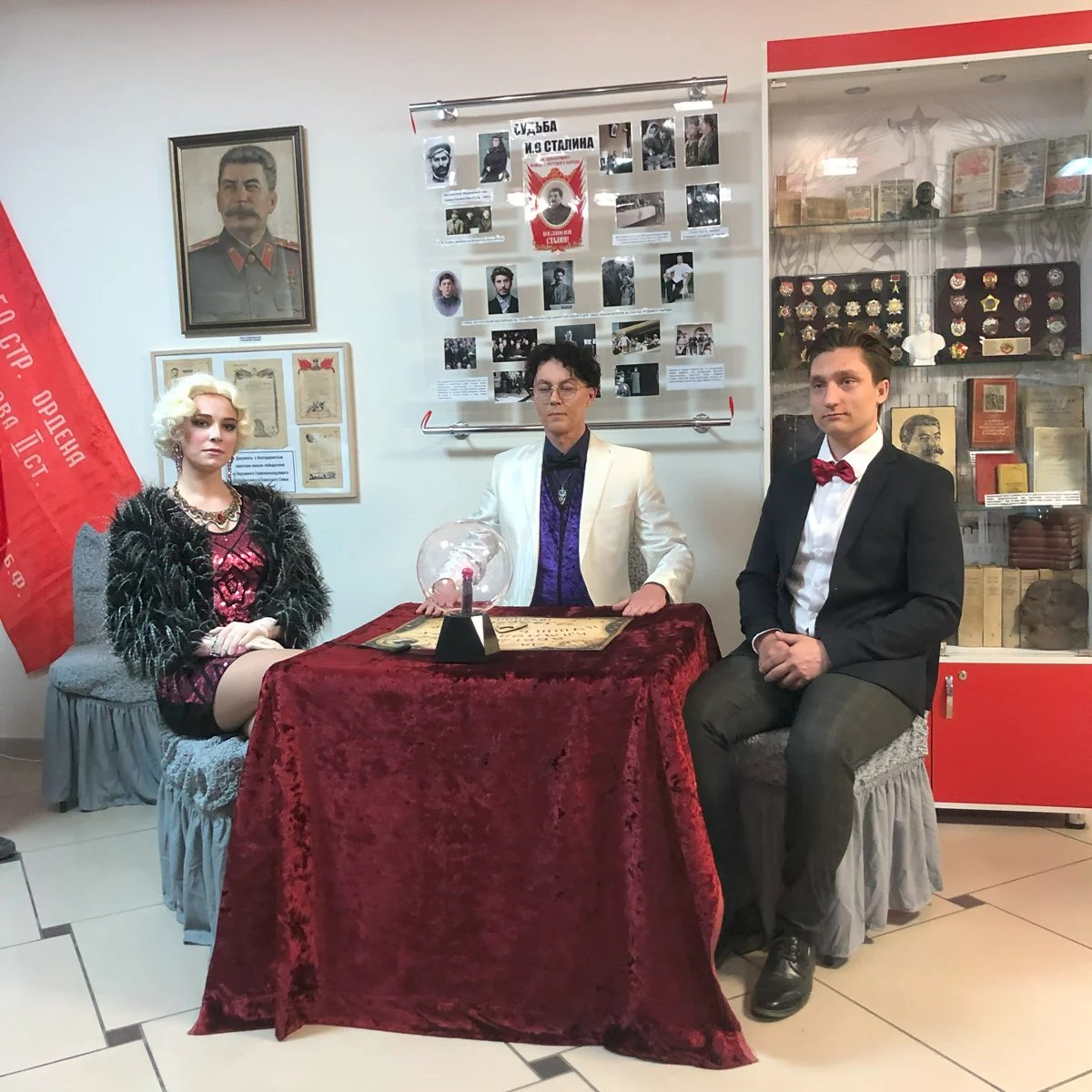
Séance. Photo: Fyodor Morozov / Novaya Gazeta Kazakhstan
‘We have nothing to fear, nothing to hide’
The Stalin Centre opened in mid-December. In an article he wrote marking the occasion, Matasov promised to “deal with Russia’s enemies, foreign agents, and Yeltsin and Navalny supporters in a Stalinist manner”.
I point out that the words “in a Stalinist manner” will make most people think of the purges and the Great Terror. Matasov counters that people with a clear conscience wouldn’t think along these lines, adding ominously that: “If you’re afraid, then there must be a reason”.
The synopsis of Bulgakov’s short story Séance can be reduced to a single sentence: Members of Russia’s intellectual bourgeoisie in the 1920s communicate with the spirit of Napoleon and then summon that of Socrates, only for the secret police to arrive and arrest everyone.
One hundred years on, the Stalin Centre activists have a quick chat with Napoleon, whose “spirit” knocks on the floor, before inviting attendees to get involved. First up is a middle-aged lady in a smart suit who looks like she’s just stepped out of the Great Ball at Satan’s from Bulgakov’s masterpiece novel, The Master and Margarita. She turns out to be a colleague of Matasov’s, a local deputy for the ultranationalist Liberal Democratic Party of Russia (LDPR).
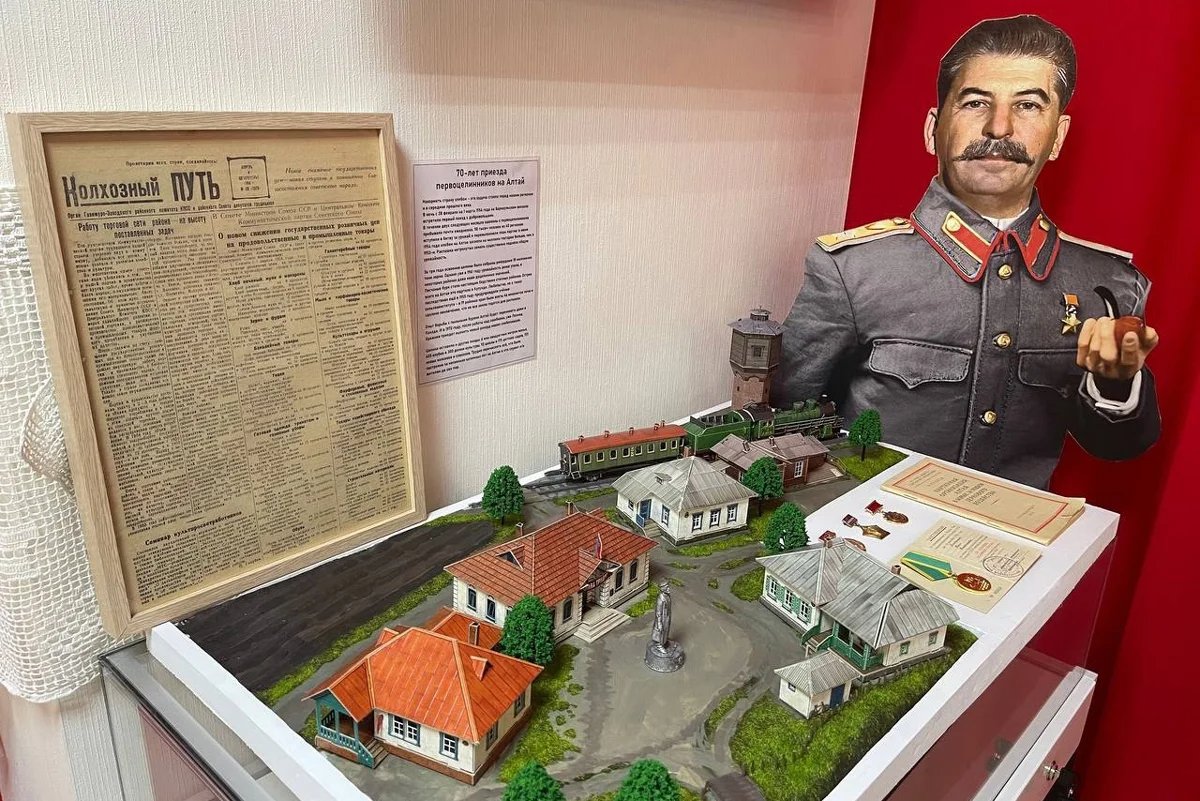
An exhibit dedicated to the first Virgin Lands campaign arrivals in the Altai region. Photo: Stalin Centre/ VK
The centre is staffed by volunteers, “mostly young people with communist views from 18 to 40”. Matasov says people come from all over Russia and even from abroad to see the exhibition, and he is especially proud to have spoken to a correspondent from French newspaper Le Figaro. The centre welcomes the media. “We have nothing to fear, nothing to hide,” Matasov insists.
‘Leaders are nothing without the masses’
Tsivileva asks the spirit of Napoleon a question. “How is [the late leader of the LDPR] Vladimir Zhirinovsky doing?” The Ouija board spells out in reply, “S-T-A-L-I-N”.
Next up is Antonina, a journalist from state-owned news agency TASS, who says she’s divorced and on the look-out for a new husband. Napoleon gives the name and first letter of the surname of her future spouse: “S-E-R-G-E-Y-M”. Next on stage is local teenager Ilya, who says: “I like the idea of Napoleon’s conquests because he was the only one who didn’t want to kill the entire Russian people. He just wanted to conquer Russia, but not commit genocide.” After a brief discussion, he asks the spirit: “Would the Russian people be better off if you were here?” The answer is an unequivocal “No”.
The main exhibit at the centre is a 200-kilogramme bust of the generalissimo. Until 2021, it was hidden in the garden of a local man whose grandfather had hung onto it during the de-Stalinisation campaign that happened a few years after his death in 1953. Next to it is an information stand about Stalin’s visit to the Altai in 1928.
Another section reveals scenes of everyday life under Stalin through photographs and artefacts. In this way, it is suspiciously similar to the museum at the Yeltsin Centre in Yekaterinburg, Russia’s fourth largest city, though that’s obviously much larger. Matasov rejects the comparison, but does say: “We wouldn’t mind if they gave us the Yeltsin Centre and we’d put a monument to Stalin in it. The whole team would be willing to move to Yekaterinburg if that happened.”
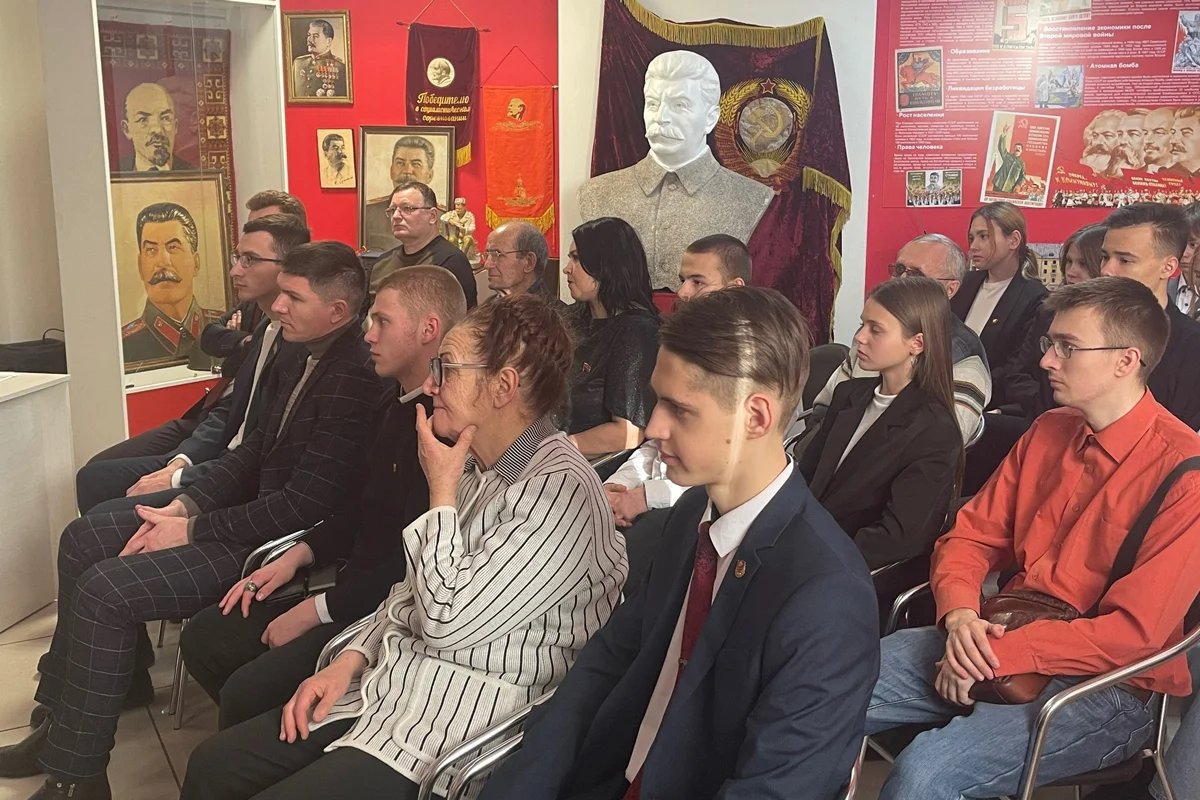
Visitors to the Stalin Centre at an event marking Lenin’s birthday. Photo: Communists of Russia/ VK
The séance comes to a sudden end when an NKVD officer in full uniform appears at the door, gun in hand, preparing to make some arrests. There is a stand-off. But then The Internationale rings out and Comrade Stalin appears with his pipe. He orders the officer to wait a moment and take the time to listen to what the people have to say for themselves. One shouts out: “I went through the wrong door”. Another blames everything on his wife.
Stalin jokes that they should be “sent to see Lavrenty [Beria]”, his secret police chief, but lets them go. Then he turns to the audience with the air of a motivational speaker, and says in a strong Georgian accent: “Comrades! You often call me the ‘father of nations’. I understand that leaders matter. They unite and lead the masses. But leaders are nothing without the masses. Hannibal and Napoleon died after losing the masses. The masses help you create new milestones in history. Thanks to the masses, people do good deeds in history. There are many young and brave people among us today. You are strength and power. Long live the Soviet people! Hurray, comrades!”
A teenager of about 15, hearing I’m from Novaya Gazeta Kazakhstan, says knowingly: “Woke liberals? I’m not telling them anything.”
Other stands at the centre focus on World War II and there’s a mannequin in an NKVD uniform and a newspaper from 5 March 1953 in which Stalin’s contemporaries recount their memories of the great man. Matasov is at pains to point out that the great leader’s political opponents spoke positively of him too, and refers to quotes from Winston Churchill, Charles de Gaulle and others.
After the show ends, the centre returns to business as usual and other visitors are admitted. A teenager of about 15, hearing I’m from Novaya Gazeta Kazakhstan, says knowingly: “Woke liberals? I’m not telling them anything.”
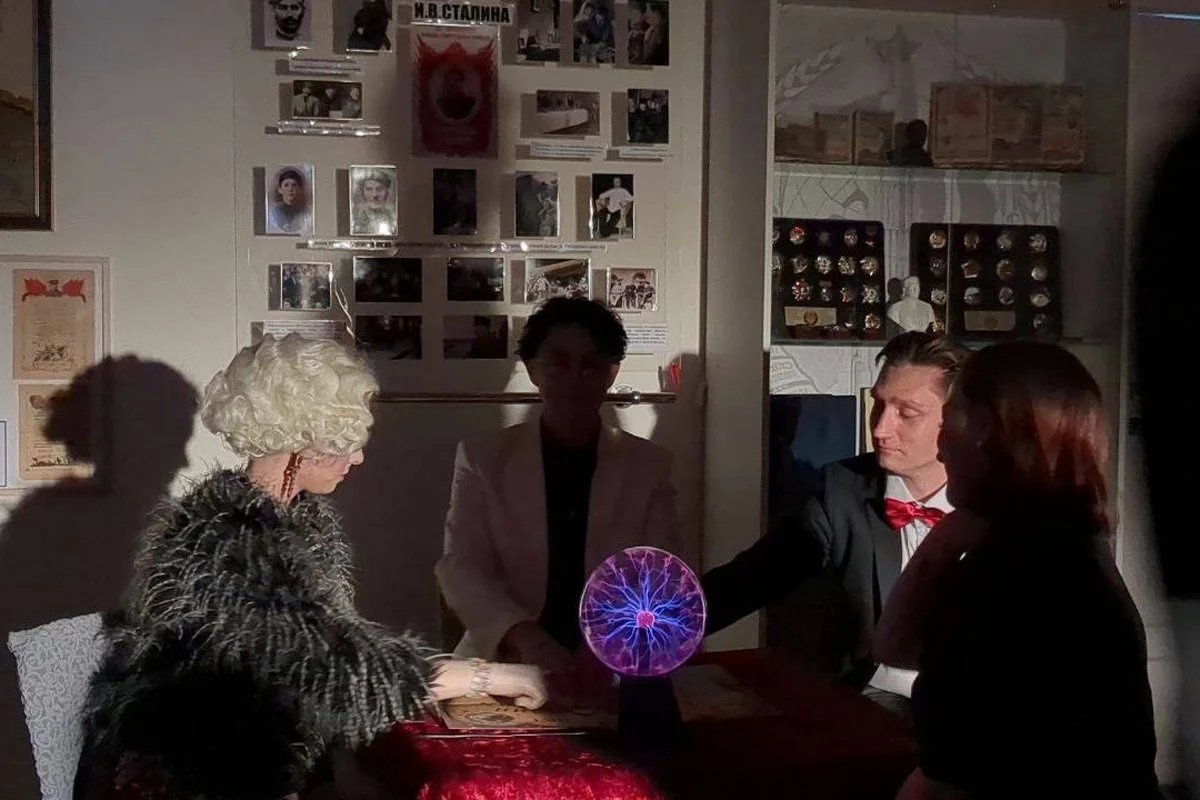
Séance at the Stalin Centre. Photo: Podslushano Barnaul/ VK
The Stalin Centre exhibition doesn’t mention the purges, the famine or the mass deportation of entire ethnic groups for perceived disloyalty. But Matasov doesn’t see the problem. In his world view, “the measures were justified because the USSR was preparing for war”, and relocating people “was strategically important for victory”.
‘Thank you, comrades!’
The last part of the centre’s Long Night of the Museums show is an appeal from “Comrade Stalin to Comrade Ksenia Sobchak”, a Russian journalist and public figure who has mentioned the centre multiple times on her Telegram and YouTube channels.
“I especially want to express my gratitude to Comrade Ksenia Sobchak. She is always against us and recently wrote a beautiful piece about us. I think our long-distance dialogue has gone on long enough, and it’s time we met in person.” Stalin then turns to the side and beckons: “Comrade Matasov, approach! If Ksenia Anatolyevna [Sobchak] ever comes to the Altai, give her a warm reception at the Stalin Centre and a chance for a lively discussion.’ ‘We will, Comrade Stalin,’ says Matasov.” There is a pause. “Thank you, comrades!”
Barnaul’s Long Night of the Museums is coming to an end. The Stalin Centre closes and we say our goodbyes. As I leave, Matasov hands me an assortment of Stalin Centre paraphernalia on which he has written: “To a friend of the Stalin Centre, a memento from Comrade Matasov.” Before I walk out onto the street, he reminds me with a smile: “We’re always looking for sponsors and patrons.”
Join us in rebuilding Novaya Gazeta Europe
The Russian government has banned independent media. We were forced to leave our country in order to keep doing our job, telling our readers about what is going on Russia, Ukraine and Europe.
We will continue fighting against warfare and dictatorship. We believe that freedom of speech is the most efficient antidote against tyranny. Support us financially to help us fight for peace and freedom.
By clicking the Support button, you agree to the processing of your personal data.
To cancel a regular donation, please write to [email protected]
